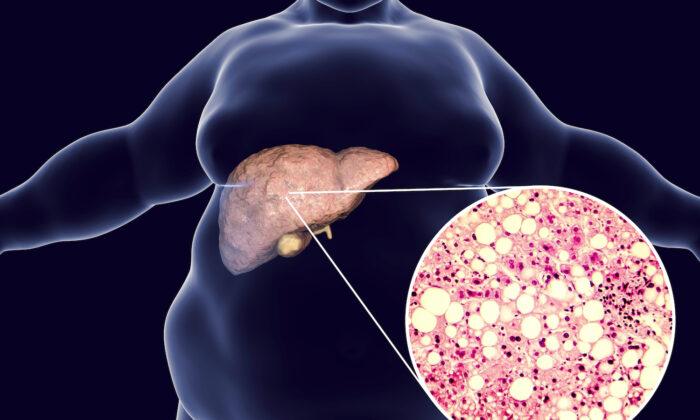
Patients suffering from scarring due to fatty liver disease now have a new treatment option: Rezdiffra, a medication recently approved by the U.S. Food and Drug Administration.
The main ingredient in Rezdiffra is resmetirom, and it is intended to be used in conjunction with diet and exercise to treat non-cirrhotic non-alcoholic steatohepatitis (NASH) with moderate to advanced liver scarring. This approval brings a much-needed standard of care treatment for a condition that affects up to 15 million adults in the U.S., according to the American Liver Foundation.
“Previously, patients with NASH who also had notable liver scarring did not have a medication that could directly address their liver damage,” Dr. Nikolay Nikolov, acting director of the Office of Immunology and Inflammation at the FDA, said in a press release. “Today’s approval of Rezdiffra will, for the first time, provide a treatment option for these patients, in addition to diet and exercise.”
How Does Rezdiffra Work?
NASH occurs when fatty deposits accumulate in the liver, even in individuals who consume little to no alcohol. High-risk factors for non-alcoholic fatty liver disease, which can progress into NASH, include diabetes, high cholesterol, high triglycerides, poor diet, metabolic syndrome, polycystic ovary syndrome, sleep apnea, and hypothyroidism.
Inflammation in the liver causes NASH, leading to scarring of the organ’s muscle tissue due to fat deposits and buildup. When scarring occurs, the liver enters a potentially life-threatening condition known as cirrhosis.
Rezdiffra works by reducing the amount of fat that accumulates in the liver in the first place. To ensure the medication’s safety and efficacy, Madrigal Pharmaceuticals, the manufacturer of Rezdiffra, conducted a double-blind, placebo-controlled study involving 888 patients. Participants received either 80 or 100 milligrams of Rezdiffra once daily.
After one year, 26 to 27 percent of participants who received 80 milligrams of Rezdiffra and 24 to 36 percent of those who received 100 milligrams experienced no worsening of liver scarring, compared to only 9 to 13 percent of participants taking the placebo.

Additionally, 23 percent of subjects who received 80 milligrams of Rezdiffra and 24 to 28 percent of those who received 100 milligrams experienced an improvement in liver scarring and no worsening NASH symptoms, compared to 13 to 15 percent of those who received the placebo.
“Demonstration of these changes in a proportion of patients after just one year of treatment is notable, as the disease typically progresses slowly with a majority of patients taking years or even decades to show progression,” according to the FDA’s press release.
During the trial, the medication caused some side effects, including diarrhea and nausea. Rezdiffra can increase a person’s risk of drug-induced liver toxicity and gallbladder-related side effects, the FDA notes.
Not for Everyone
Rezdiffra is not suitable for everyone.
People with decompensated cirrhosis should not take this medication. Additionally, Rezdiffra may not mix well with certain other drugs; people taking particular statins for lowering cholesterol levels can potentially experience significant drug interactions.
Furthermore, anyone whose condition worsens while taking Rezdiffra should stop using it.
Rezdiffra received approval from the FDA through the agency’s accelerated approval process. This process allows for a shortened pathway to approval for drugs or medical devices that treat serious conditions or address an unmet medical need.
Rezdiffra is expected to be available on the U.S. market by April and will be distributed through a limited network of specialty pharmacies, according to Madrigal Pharmaceuticals.